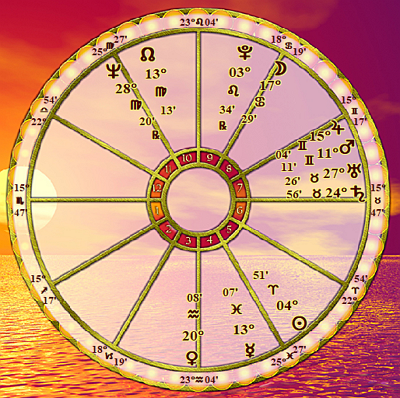 I was recently re-reading a monograph by Robert Hand titled Day & Night: Planetary Sect in Astrology. Robert Hand takes us back to Greek astrology, and asks how a chart might have been interpreted say 1600 years ago, perhaps by a practitioner in ancient Alexandria. Alexandrine astrology is not really my thing – I am more familiar with William Lilly’s Seventeenth Century approach. However, Robert Hand makes some important points.
I was recently re-reading a monograph by Robert Hand titled Day & Night: Planetary Sect in Astrology. Robert Hand takes us back to Greek astrology, and asks how a chart might have been interpreted say 1600 years ago, perhaps by a practitioner in ancient Alexandria. Alexandrine astrology is not really my thing – I am more familiar with William Lilly’s Seventeenth Century approach. However, Robert Hand makes some important points.
Hand suggests that the most important consideration when looking at a horoscope is whether a person is born by day or by night. This leads to the first generalization to make, when judging a chart – is someone a night person or a day person? Donald Trump was born in the hours of daylight, Barack Obama at night. Trump is positive and outward going, but shows little in the way of reflection. Obama, by contrast, is more thoughtful, and possibly more of an introvert. Yet there are limits to this kind of generalization – using such a simple method of chart interpretation, you’d soon make a mistake.
The system comes into its own when you consider the individual planets. Each one has a diurnal or nocturnal nature. The diurnal planets, which function best during the hours of daylight, are the Sun, Jupiter and Saturn. The nocturnal planets are the Moon, Venus and Mars. Mercury can be either, depending on whether it is a morning or evening star. Mercury is a morning star when it rises before the Sun, an evening star when it rises after. Donald Trump’s Mercury is in Cancer, his Sun in Gemini – in other words in later degrees. He therefore has a nocturnal Mercury, in a diurnal chart. This means, all things being equal, that it won’t function particularly well. Obama’s Mercury is in earlier degrees of Leo than his Sun, making it a morning star, and a diurnal planet. It would function best in the hours of daylight, but Obama is born at night.
Let’s take some other examples. Robert Hand looked at the charts of Adolf Hitler and Bill Clinton. Both were born in the hours of daylight and both had Saturn high in the chart in Leo. Saturn, as a diurnal planet, is strengthened by the very fact that it is a daylight chart. This is in spite of the fact that Leo is the sign of Saturn’s detriment. Saturn is the planet of authority, and it is happiest when the Sun is above the horizon. In the case of Turkish Prime Minister Recip Tayipp Erdogan, he was born at night, and he has Saturn conjunct the MC in Scorpio. The night time birth will weaken Saturn, and perhaps ensure that he doesn’t get the total control for which he craves.
There is then the issue about whether a planet is above or below the horizon. According to Hand’s system, a diurnal planet is best placed above the horizon during the hours of daylight, below the horizon during the hours of night. For a nocturnal planet, it is best placed above the horizon at night, below the horizon during the day. This is why Erdogan’s Mars is so strong – it is a nocturnal planet, above the horizon in a nocturnal chart. Iconic boxer Muhammed Ali also had Mars in this position.
The final piece of the jigsaw is sign. The diurnal, masculine signs are Aries, Gemini, Leo, Libra, Sagittarius and Aquarius. The nocturnal, feminine signs are Taurus, Cancer, Virgo, Scorpio, Capricorn and Pisces. The diurnal planets work best in diurnal signs, the nocturnal planets in nocturnal signs. However Hand upoints out that there is a difference of opinion when it comes to Mars. It is a nocturnal planet, but it is masculine. Greek sources suggest that ideally it should be in a nocturnal sign, while Arab sources suggest that a diurnal sign is best. My own view is that one should go with the Arab view.
At the top of this article is the horoscope of Aretha Franklin, who has recently died. She was born at night, on March 25 1942 at 10.30 pm in Memphis, Tennessee. This means that all her nocturnal planets, namely the Moon, Venus and Mars, are strengthened. Likewise her diurnal planets, the Sun, Jupiter, Saturn and Mercury, are weakened. Of course it should be pointed out that by most standards, her Sun is in a great position. It is ruler of her Tenth House of career, and it is in Aries, the sign of its exaltation, in the Fifth House of creative expression. Her Venus, as a nocturnal planet in a nocturnal chart, should ideally be above the horizon in a feminine sign. It is not – it is below the horizon in Aquarius. Not surprisingly, her two marriages didn’t work well.
Her Moon, by contrast, was wonderful. From a diurnal-nocturnal perspective, it benefits in all three ways. It is a night time birth, it is above the horizon in the Ninth House, and it is in Cancer, a feminine sign. The Moon is about the public, and about being able to express emotion – helped by the fact that it trines her Scorpio Ascendant. The dominance of the Moon is further emphasized by its rulership of the planetary hour.
There are many ways to evaluate planetary strength, and one sometimes has to deal with contradictory information. However, the nocturnal-diurnal distinction is not something that should be ignored.